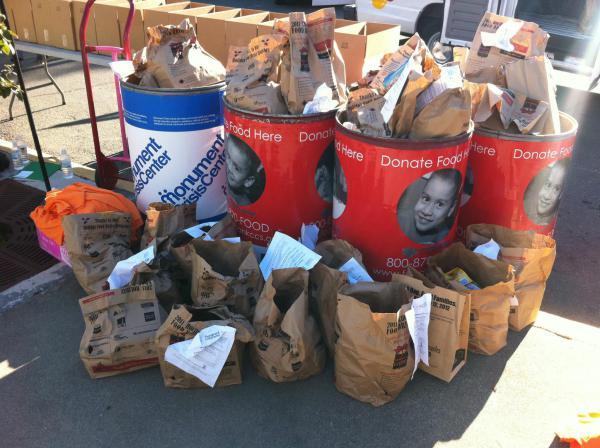Global supply chain woes affecting local food nonprofits

CONCORD, CA (Dec. 8, 2021) — The economic nightmare of endless stacks of containers crowding West Coast ports and cargo ships floating in limbo offshore waiting to offload their precious cargo is affecting East Bay nonprofits.
“Our clients are feeling the burden of higher prices for groceries and gas,” said Sandra Scherer, executive director of the Monument Crisis Center (MCC). “We are seeing many more clients as a result, because they just can’t stretch their paycheck to cover their basic needs.”
Food banks serving the hungry throughout the Bay Area are also acutely feeling the pinch as the economic effects of the pandemic persist.
Babak Mehryar, food purchasing manager with the Food Bank of Contra Costa and Solano, detailed the headaches caused by price increases of 8-10 percent that the food bank is having to offset. These include increases due to an overall rise in the cost of living, fixed and variable overhead costs, and increases in transportation/shipping costs due to oil/gas prices, labor shortages and insurance.
“So, all of the above reasons will affect our food traders, importers, domestic producers and canners who use the finished goods and raw material,” Mehryar said.
More clients, fewer supplies
At MCC, they find that either a product is unavailable or it is an extremely long wait. The trickledown is hitting the food distribution program particularly hard, and there is a constant need for substitution, flexibility and revised budgeting.
“The other issue is that with costs rising dramatically and more people seeking help, we need more financial contributions to buy in the quantity we need,” Scherer noted.
MCC is seeing more than 6,000 people a month for food assistance, about double pre-pandemic levels. That need is now being met by fully vaccinated volunteers, albeit in restricted numbers due to COVID safety protocols.
Renewed efforts at White Pony
Some smaller local entities, including the St. Bonaventure Parish Food Pantry in Concord, are not reporting issues. The local food bank supports the pantry with nonperishable food.
Meanwhile, White Pony Express (WPE) has taken creative steps to deal with the uncertainty triggered by the supply chain woes.
WPE spokesman Steve Spraitzar noted they have been using the Food Hero Rescue app, where food donors can signal when they have excess food. A volunteer then picks up and delivers the food directly to a matching food recipient organization.
Before the supply chain challenges emerged, WPE was rescuing and delivering on average 15,000 pounds of healthy food each day, seven days a week, to agencies across Contra Costa County. Today, that number is down to 10,000 pounds of food per day.
Further, costs for fuel, boxes and liners, plus difficulties recruiting staff, have contributed to the operational challenges the organization faces.
Coming together to serve
As soon as WPE became aware of the potentially devastating impact of the supply chain issues, the group redoubled efforts to connect with food distributors, grocers, farmers, farmers markets, restaurants and catering companies.
The team also contacted the agencies they serve, including pantries, shelters, group homes, churches and schools. WPE learned more about the groups’ needs during the winter months and whether they had other sources of supplemental food.
“The word ‘no’ is not in their vocabulary, but there is deep concern that they will need to reduce the size of their free food deliveries,” Spraitzar said.
White Pony typically leans in during the holidays, but the staff is having to think creatively about how to deliver food, gifts and cheer this season. Its volunteer community is helping tremendously by hosting drives and partner events, collecting food, cold weather clothing and children’s gifts to share with their neighbors in need.
“The motto at WPE is ‘All of us taking care of all of us.’ This is a point in history where it is evident that coming together as one human family is the only way we will be able to thrive and survive,” Spraitzar said.
Scherer echoed this sentiment.
“We will continue to adapt as needed, look for more financial contributions and look for more ways to source the food,” she said.
